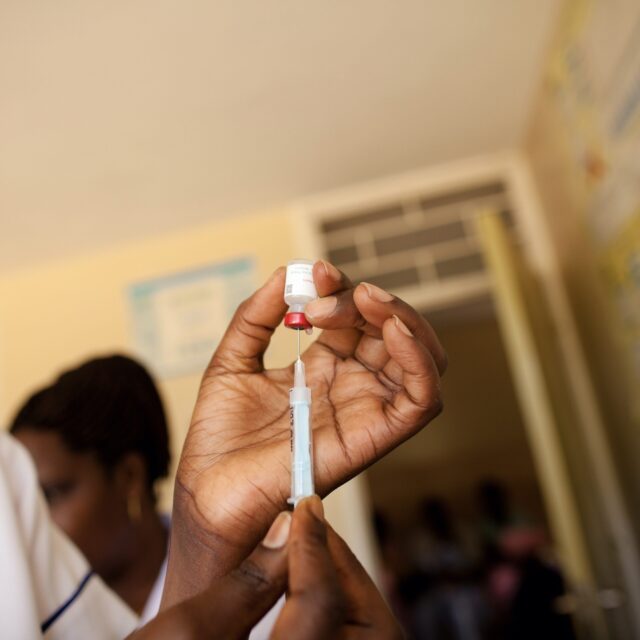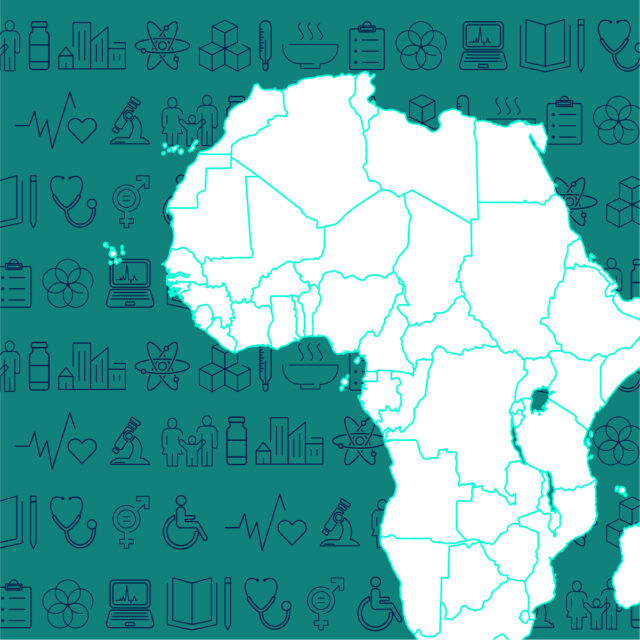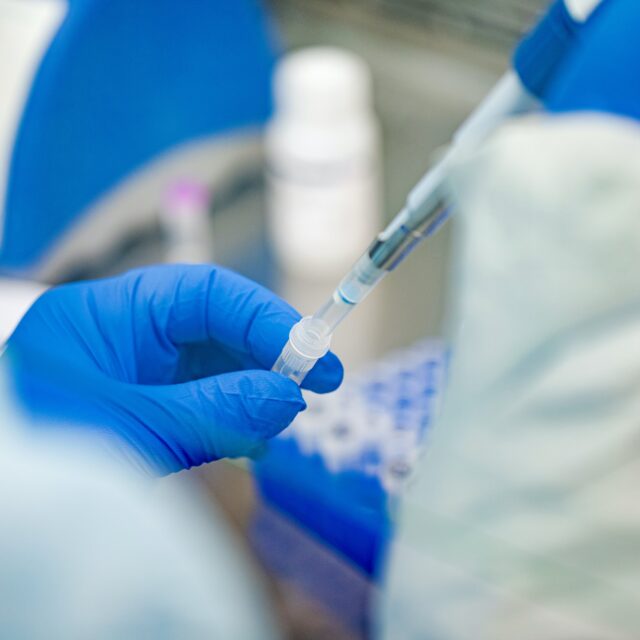Many African countries reacted positively to the recent news that the German biotechnology company BioNTech will be building COVID-19 vaccine manufacturing plants in Rwanda and Senegal. Across the continent, insufficient and unpredictable vaccine supplies, poor distribution networks, and infrastructure challenges have hampered mass vaccination efforts. Proponents of vaccine technology transfer to African countries view this development as a positive step to improve vaccination rollouts across the continent.
The pandemic has been a wake-up call for African countries that rely solely on imports or donations to vaccinate their populations. Over-reliance on vaccine donations through the COVAX vaccine-sharing facility and individual governments has led to a situation where the demand for vaccines has outstripped supply. African countries have been struggling to vaccinate their populations mainly because there just aren’t enough vaccines to go around.
Currently, only 10% of Africa’s population is fully vaccinated against COVID-19 compared to more than 70% in some high- and upper middle-income countries. By mid-January, 9.7 billion COVID-19 vaccine doses had been administered globally; only 334.3 million (3.4%) were administered in African countries. Some countries, such as Burundi, the Democratic Republic of the Congo, and Chad, have less than 1% of their populations vaccinated. If current trends continue, most African countries – home to more than 1 billion people – are not likely to achieve the WHO target to vaccinate 70% of their populations by mid-2022. In fact, it could take several years before some African countries fully vaccinate the majority of their populations against COVID-19.
Waiving intellectual property rights
Since the start of the global COVID-19 vaccine rollout, low- and middle-income countries have called for the diversification of vaccine production across different geographical locations through temporary waivers on intellectual property rights. India and South Africa put forward a proposal to the World Trade Organisation (WTO) for a temporary waiver of the Agreement on Trade-Related Aspects of Intellectual Property Rights (TRIPS). More than 100 WTO member countries have supported such a waiver. Advocates of IP waivers reference the HIV/AIDS outbreak, when IP rights were waived and countries such as Brazil and South Africa started producing generic antiretrovirals. It then became possible and affordable for HIV/AIDS patients, especially in low-income countries, to receive treatment.
Big pharmaceutical companies are hesitant to waive intellectual property rights on their vaccines. They argue that they must recover their costs, and therefore cannot share their technology for free, even though many of the companies received massive infusions of public funds to help finance their COVID-19 vaccine research and development. Even in the case of Rwanda, the BioNTech’s agreement stipulates that intellectual property rights will remain with the company. The deal involves BioNTech managing the manufacturing facility initially, and then transferring ownership and expertise to local manufacturers over time. Winnie Byanyima, the executive director of UNAIDS, has described COVID-19 vaccine monopolies as “a moral disaster.”
Constraints to local manufacturing
However, vaccine production in African countries faces several other challenges beyond patents. Most African countries simply lack the needed infrastructure to produce vaccines in general. Africa currently imports 99% of the vaccines it uses. Only a handful of countries in Africa, including Egypt, Morocco, Senegal, Tunisia, and South Africa, have manufacturing plants that can produce vaccines, the largest of which is the Biovac Institute in Cape Town, South Africa. Moreover, most of these plants deal only with the final stages of production, such as filling vials and packaging, not manufacturing from scratch.
In addition, vaccine production in these countries tends to focus on in-country distribution, rather than exports, which means most African countries still rely on imports. And most African countries rely on international agencies for vaccines, especially for childhood diseases.
Vaccine manufacturing is also expensive. Setting up such plants would therefore require huge investments by investors, donors, or governments. Time is another constraint. It can take several years before a manufacturing plant obtains all the necessary regulatory approvals and quality control processes before it can start production. This means COVID-19 vaccine production in Africa could be delayed for several years.
African countries will also need to build up the knowledge base and skills required for COVID-19 vaccine production. Some of Africa’s best scientists have left to seek opportunities in Western countries, where facilities are better equipped and resourced. This brain drain includes John Nkengasong, the current head of the Africa Centres for Disease Control and Prevention. In 2015 alone, more than 13,000 African doctors emigrated to the United States. The departure of highly qualified health professionals and scientists has diminished the skill sets required to produce vaccines locally. Knowledge transfer would therefore be a critical component of local vaccine production. New manufacturers of vaccines will need to acquire and absorb knowledge, which would involve direct collaboration with those who hold this knowledge, says Klaus Meyer, professor of international business at Western University.
In April 2021, the African Union and the Africa CDC set a target of producing 60% of vaccines locally by 2040. Local vaccine production would not only help resolve the current vaccine inequity crisis, it would also ensure that African countries are not reliant on donations that, in some instances, are close to their expiry dates. Recently, for example, Nigeria destroyed more than 1 million COVID-19 vaccines because they had expired. East African countries have also raised the alarm about some 40 million vaccines in the region potentially going to waste because they are nearing their expiry dates. And early this month, the United Nations Children’s Fund (UNICEF) announced that low-income countries had rejected 100 million COVID-19 vaccines distributed through the COVAX facility because they had very short shelf lives. Local vaccine production could alleviate some of these challenges.
Pegging hopes on mRNA
Messenger mRNA, or mRNA, vaccines could be manufactured at very little cost – but big pharmaceutical companies are currently monopolising production. The mRNA technology is the key ingredient in the Pfizer/BioNTech and Moderna COVID-19 vaccines. It’s different from traditional vaccines because, rather than producing antibodies that prevent people from getting sick, it creates proteins that prompt an antibody response. Although the mRNA-based COVID-19 vaccines are new, the technology to produce them was developed years ago. Transfer of mRNA technology is recommended because many of its technical features are free of intellectual property rights in many countries. Moderna’s mRNA vaccine also does not need highly specialised facilities, which means that African countries that decide to produce this vaccine can do so relatively quickly, says Global Citizen’s Khanyi Mlaba.
The mRNA technology has given hope to African countries such as South Africa, which plans to establish the continent’s first mRNA vaccine hub, an initiative that is being led by WHO. The Biovac Institute in Cape Town is already geared up to producing 100 million doses of the Pfizer/BioNTech COVID-19 vaccines annually. “If manufacturing know-how was shared with the WHO through its South Africa Covid-19 mRNA hub, qualified manufacturers worldwide could begin to produce it,” says Byanyima. Experts have already been identified in more than 100 qualified companies in Africa, Asia, and Latin America that have the capacity to produce COVID-19 mRNA vaccines.
As more such hubs are created across the continent, we are likely to see several African countries become more self-reliant not just in COVID-19 vaccines but in other vaccines as well. This will help them deal more effectively with the current pandemic and future public health emergencies.



